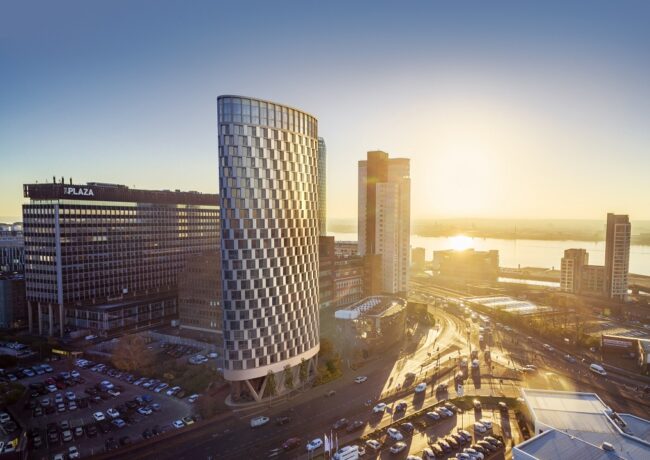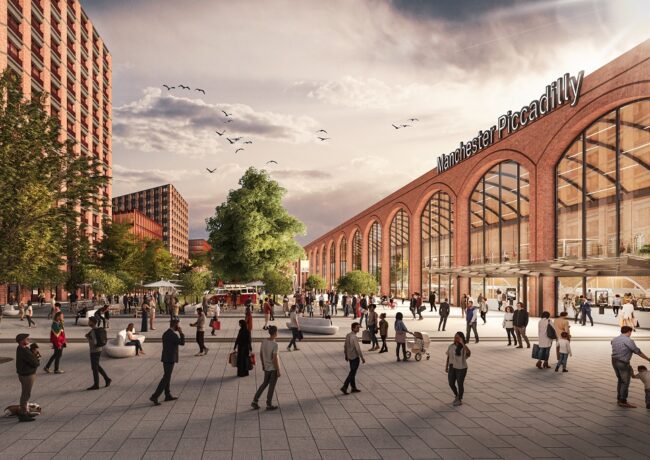Liverpool developer outlines plans for Hodder apartments
A planning application for a £35m 27-storey building, the first of a pair designed by Hodder+Partners, has been submitted to Liverpool City Council.
Prospect Capital and Wilcocks & Wilcocks, advised by Indigo Planning, said that today they’ve put in plans for Ovatus 1, a large-scale residential tower near to Liverpool’s central business district.
Ovatus 1 is the first phase of a two-tower development on the site; an application for an adjacent taller tower, Ovatus 2, will be submitted in 2017.
The first tower will total 168 homes, including 14 three-bed apartments, 88 two-bed apartments, 22 one-bed apartments and 44 studios. There will also be 187 cycle storage spaces provided, as well as public realm improvements, including hard and soft landscaping.
The development sits within the buffer zone boundary of Liverpool’s World Heritage Site and is located less than half a mile away from the Princes Dock, which backs onto the waterfront of the River Mersey.
Craig Blackwell of Prospect Capital said: “With the site’s key gateway status in Liverpool, as well as its landmark nature and overall significance, we knew that bringing the right team together on this project was very important.
“In appointing Indigo Planning and Hodder+Partners, as well as WSP Parsons Brinckerhoff and Planit-IE, we are confident that the team in place has the skills and expertise to do great justice to a forthcoming special addition to Liverpool’s skyline.”
Martin Wilcocks of Wilcocks & Wilcocks said: “The project is currently fully funded and financed to ensure the scheme’s deliverability, with enough presales secured to ensure the tower is fully occupied on completion. A testament to the demand for this kind of stock in Liverpool.”
Wilcocks and Blackwell are long-term business associates, based in Liverpool. They are currently delivering 90 flats in an office-to-resi conversion at The Residence.
The Ovatus 1 application is set to be determined towards the beginning of 2017, following which the developers said they hope to start on site in April 2017.





Yet another residential development. Isn’t it time that “business district” was put in quote marks when discussing where all these developers are placing their towers and, worst of all, office to residential conversions? The last business related development in the “business district” was a refurb of a couple of minor office blocks.
What’s the point of building all these towers if there are no decent jobs left for the residents because there’s no space left for decent companies to be based in the city centre? The way things are, in future years, Liverpool’s rush hour might be starting at 6am and be on roads heading away from it.
I don’t see anything to get excited about.
By Mike
I agree. In 10-15 years there wont be any jobs in the city centre except low paid jobs in the tourism sector. Liverpool’s business district is embarrassingly deserted at rush hour for one of Britain’s biggest cities. Yet Joe Anderson et all are all doing absolutely nothing about this. An absolute shame on them. The city deserves so so much better. If only the city had visionary leaders who thought big and had the courage to do something a about it NOW. All of Liverpools offices are being turned into apartments, new apartments are being proposed and student flats are everywhere. No Jobs. Liverpool is basically going to be a commuter town to Manchester in 20 years so if you want a career, be prepared for the daily commute. How Liverpool has fallen from a truely world city up until WW2 to what it is now…..
By Paul
No parking included? This is a major flaw of a high number of these new schemes. This isn’t London and people need/want cars.
By Stanley
Yes.. but at last we have a quality architect producing a building of the appropriate scale and detailing for this part of Liverpool city centre. Bring it on!
By LEighteen
1. What is wrong with residential development in the traditional business district? It is creating demand for old buildings and new developments – if there was demand for them by business, offices would be being built instead. Having people living centrally is more sustainable than building in the suburbs (that’s before even considering Green Belt arguments), and should actually increase the number of jobs in the city centre.
2. Liverpool Waters includes a load of office development anyway.
3. If people really love their cars that much, they won’t buy/rent these flats in the first place – but I suspect that won’t happen. Alternatively, if there is a huge demand for parking, some enterprising individual will fill the gap with multistoreys.
Stop complaining; recognise that this is really positive for Liverpool. People want to live here!
By Zayne
It is a source of continual ire that the city’s key decision makers are unable to usefully draw upon the planning and development precedents of other European cities.
I have for long wished that developers be made to contribute towards a form of ‘culture tax’; I can appreciate that developers – like any other business – operate with the bottom line in mind but the built environment shouldn’t be a poor quality construction free for all as appears to be the current state of play in Liverpool. Perhaps such a measure might add to our portfolio of civic offerings and start to readdress the balance in preserving and furthering the city’s cultural legacy.
Hodder’s scheme is disappointing and pays no subtle reference to the city’s genius loci as one might reasonably expect from an accomplished architect.
By Tom
Liverpool City Region will never become a commuter town to Manchester ?? what a strange thing to say?
Liverpool is far to big, and growing massively each year, fastest growing economy outside the capital.
By Livercool
There is no reason why people cannot commute between both cities to both cities.
By Elephant
Would it be the end of the world if Liverpool was a commuter town to Manchester? Its a nicer place to live than Manchester; Manchester is bigger and better connected, so it makes perfect sense.
By Zayne
There is a massive amount of interflow of traffic and people between the Cities already.
Judging by the queues and at both ends of the M62 in the mornings and evening.
Some think tanks and observers routinely describe us as one big agglomeration.
We should all build on that and work closer together to compete and rival other such areas.
Peace and love and all that stuff.
By Man on bicycle
Zayne: Living and working in Liverpool is much better than commuting to Manchester i would rather benefit my local economy , i am not completely bias i do tent to visit up the road from time to time but much prefer living and working in here.
By Livercool
Yes,cut out the petty parochials and combine GM and Merseyside economically with Warrington included too. This I am sure is the intention of Burnham and Rotherham,once they become Mayor. That is an economy of about 100 billion pounds a year,more if Chester and the Posh bits of Cheshire,south of Manchester are included,and the High Peak.
By Elephant
Glad you agree Liverpool is a better place to live. On working: yes, I’d prefer to live and work in Liverpool, but let’s be realistic: Manchester is much bigger, much better connected to the rest of the country, already has a critical mass of business based there, has good local leadership and (still just about) the interest of central government. The north-west should make the most of that. Basically I agree with Elephant on this point.
By Zayne
Zayne: Liverpool currently is upgrading its infrastructure just like Manchester , i currently have a fantastic job in Liverpool like so many i know here so no current or future plans to ever work in Manchester . Liverpool is changing every month growing businesses are re locating here , the Port Of Liverpool is thriving , Tourism i could go on.
By Livercool
Liverpool is beginning to take off economically now,it has now surpassed Birmingham for average wages. This is all good news for the North West. I hope that there can be something of a ‘Lancashire love in’ and these petty squabbles about football and bands can be relegated to the pub,with Manchester. There is no reason why the two new mayors cannot work together. A joint enterprise between these two cities and their hinterlands could be this country’s other economic engine.
By Elephant
Elephant: I agree.
By LIVERPOOL
Elephant, until the horrific HS2 and northern powerhouse came along, Liverpool reached national average in terms of wages. All off its own back.
In fact, since the recession and thanks to the continual high profile snubs like HS2 and HS3 and wasteful prioritisation of one city over another, Liverpool wages have stagnated and fallen well behind elsewhere as a result of growing primarily on low wages rather than a mix, and if they have started to recover at all it can only have been very recently as the past five years has been treading water.
It’s a bit late to talk of a “Lancashire love-in” when the past decade has been spent lapping up government riches, hogging the limelight and taking every opportunity to depress your neighbouring economy and leaving it with little but student developments.
I’d very much favour Liverpool overtly turning its back on all the northern powerhouse nonsense, and focusing solely on defending and growing its own economy. If those that have spent the past decade gleefully watching on as hard fought progress is turned to ashes are now hoping/pleading that “we will work together” then I can only assume that for one reason or another the time is now right for Liverpool say “no ta”.
By Mike
Interesting, but many negative comments; Liverpool will never become a commuter town of Manchester; and if it ever becomes a backwater, then Manchester is finished too. Manchester needs Liverpool more than Liverpool needs Manchester.
Everyone would welcome more jobs (Manchester too) but let’s not forget the already 10,000 hi-tech Bio-science jobs announced this June for Liverpool; or the investment Bill Gates puts into LSTM; or that Liverpool remains the second wealth management city in the nation beating Leeds, Edinburgh, and errr Manchester (significantly)! Even ‘Manchesters’ Co-Op (sorry Rochdale) has its Financial Services based in Skelmersdale (not the Bank HQ); and M&S Financial at Chester, Alliance & Leicester in Bootle. Or the fact the Centre for Cites research puts Liverpool at the centre of the nation’s second science cluster, based upon aerospace, chemicals, bio life and medical sciences, and new vehicle research (JLR have announced major investment in electric vehicles); with Daresbury, Preston, Runcorn, and Warrington surrounding and sharing expertise. Liverpool has headed the entrepreneurial city list for the last two years ( http://www.growthinbusiness.co.uk ). This before we mention CV-Library’s research showing Liverpool’s job growth rate at 45%, or Liverpool Waters, the Knowledge Quarter, the 30 acre Paddington Health science park, the Cruise Terminal expansion, the fact Royal College of Physicians has chosen Liverpool ahead of Manchester and Leeds for its northern HQ, or that Liverpool already hosts several Japanese European headquarters. Also not mentioned is Liverpool’s food industry; not the classy restaurants and the dockside cafe; but an industry that vital to the nation. Five of the Europe’s top container shipping lines are based in Liverpool, one moving its HQ out of London. We all know about lie, lies and statistics; but Liverpool resident earnings overtook those of Manchester before 2010 and have maintained an annual increase. THIS is just the tip of the iceberg. It doesn’t matter that thousands of jobs will be created in Tourism (yippee); and that means more hotels, restaurants, taxis, shops, and city events etc, etc (yippee), all those scientists, researchers, and hi-tech managers and employees will all need houses too.
One must know how a city works before one dismisses it. Wake up, Liverpool is a very different city than it was 5, or 20, or 50 years ago. Long may it succeed,……..and Manchester too, and Warrington, and Blackburn with its 4,000 holes.
Those who seem to want Liverpool to fail, think again, for if it were too; the entire northwest of England would suffer economically.
By Billy
I agree with you Mike that Manchester has been patronised more, plus I agree that Liverpool should be on the HS2 route too. It is the only major English city not on the route and this is a disgrace. Liverpool is beginning to grow however and now contributes more to the British economy per capita than Birmingham. I hope the government look again at the folly of leaving Liverpool out of this scheme.
By Elephant
@Billy
Nice to see comments that are actually factual – brilliantly well put !
By Livercool
I agree that Liverpool basically owes its current economic vitality (all be it fragile) almost entirely to government largesse through decades of regional policy that have tipped public resources into the city at the expense of everywhere else but that makes it all the more important that we do not mistake modest improvements at the behest of the state for organic entrepreneurial activity (Liverpool’s business creation rate and stock of businesses per capita languish way below comparable cities). It should also guard against claiming successes of other places such as Chester, Warrington, Manchester, Preston or Daresbury as its own. Such bravado and hubris may be in the local physche (it is a city of militant dockers and colony-exploiting salesmen – rhetoric is a local speciality) such boosterism may be instinct but serves only to paper over the structural weaknessses in the local economy. Liverpool is relatively uninfluential in its hinterland with only weak economic links to those centres. It also serves to spread angst and misinformation and works against practical interventions to improve the economy. If you’re convinced the world is against you then you cannot engage in the fact that HS2’s route is based on robust, rational and even handed cost-benefit analysis. Engage with this fact and you start to take steps to address those local weaknesses and so improve the economic case for a captive link (although HS2 will connect to the city directly in any case). I’m not optimistic though. As mentioned, Liverpool is a city built on rhetoric, not rational, scientific, evidence based inquiry like cities with a genuine scientific heritage like Manchester. This is where the two cities can learn from each other; Liverpool adopting a more scientific approach and Manchester adopting Liverpools approach to humane city-building (if not perhaps it’s talent for rhetoric!).
By Away-o-politan
Parochial and insulting rubbish like the above by “away-o-politan” really shouldn’t be on the internet, let alone on a news website.
By Mike
Away-Oh-politician
You will never become a politician and the reason for that is you spout rubbish and haven’t a.clue what you are talking about .
At least What Billy wrote made sense and was factual,that seemed to hurt you feelings.
By LIVERCOOL
Away -o – politan should remember that due to its greatness as a port,Liverpool was more transient.There is always this assumption that Liverpool was,this to the core working class city. Until the mass exodus of its wealthy to Southport and the Wirral,it was predominantly middle class.The grand Georgian terraces are testament to that.There is no way that militant dockers lived in those houses. Plus the cultural scene of great theatre and music,is testament to the demograph of the city,prior to the departure of its merchants.Apart from Manchester,no other northern city has that legacy.It was the only city to have its only Whitehall ministry and this was because it contributed more to the economy of Britain than anywhere else,dwarfing London’s economic output at that time. Liverpool was always the North’s most sophisticated city,with the term Liverpool gentlemen,Manchester men and Salford lads,more than just banter. I don’t live there,but it is without doubt one of the most iconic cities on earth.
By Elephant
Never been impressed with Liverpool, always seemed very aggressive, especially if you aren’t a northerner.
By Janet
@Janet hi Janet i am from Australia and currently living in Liverpool after moving from Manchester where i think you may find what you say is true if you live in that city, i have found Liverpool warm and friendly and much more charming than that hole down the road so stop being ridiculous – i also found in Manchester if you mention Liverpool they foam from the mouth
By Shane
Away -o – politan; “I agree that Liverpool basically owes its current economic vitality (all be it fragile) almost entirely to government largesse through decades of regional policy…..”
Not sure which city you live in, but Liverpool has not seen decades of government intervention whatsoever. European perhaps,… but the drive has only come from Liverpool. Also stated is the weak economic links, poor capata business growth and the militant dockers; Liverpool is a city based upon rhetoric ?????????? Not read the facts then; ……dont let them get in the way!!!!!
I dont live in Liverpool, but it is abundantly clear to anyone who has studied urban economics that it is Liverpool that is structurally more important in the northwest than any other town in the area; and that it because those towns principally rely on it for their wealth (some for their creation). It is not a competition between Manchester, Warrington and Liverpool; Warrington has certain advantages over Liverpool and Manchester, Liverpool has other advantages. Away -o – politan;….you need to look at the NW strategically and from a structural economic perspective, then you will see how and why Liverpool is so importamnt to the rest of the area. And perhaps look at the facts.
By Billy